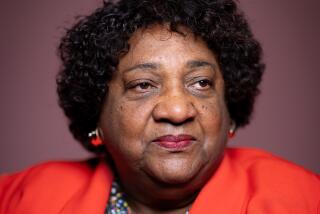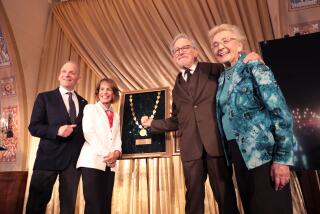Reno Urges Americans to Shun Bigotry
- Share via
Declaring her belief that courage can vanquish evil, U.S. Atty. Gen. Janet Reno on Thursday challenged all Americans to denounce bigotry, embrace diversity and move into “a future free of the hatred that breaks us apart.”
Speaking at the Simon Wiesenthal Center’s Museum of Tolerance--in a neighborhood of kosher bakeries and a Muslim center, Thai restaurants and a posh country club--Reno urged her audience to publicly praise “the diversity of America, which has made it the greatest nation in the world.”
Reno devoted much of her half-hour address to describing tactics the United States has developed to fight international terrorism, such as cutting off financial contributions to suspected terrorist groups. Though she rattled off a chilling list of hate crimes, from air piracy overseas to the burning of black churches in the United States, Reno pronounced herself optimistic that good will triumph.
“Never in my 57 years have I ever been so proud of this nation and so sure its people can come together,” Reno said.
Reno drew the heartiest applause from her 350 listeners when she announced a program to compensate U.S. citizens who found themselves trapped in Nazi concentration camps during the Holocaust.
Last fall, the German government agreed to pay $2.1 million to 11 such survivors. The program Reno announced Thursday extends eligibility to other U.S. survivors who apply by Sept. 30. They will receive one-time payments of an amount to be determined later, depending on how long they were imprisoned and whether they suffered disabilities.
Already, one claimant has come forward: an American captured by Germany as a prisoner of war and sent to the notorious concentration camp at Buchenwald. But as Reno acknowledged, few U.S. survivors are still living, and fewer still will qualify for the German money. Those subjected to forced labor but not herded into prison camps will not be eligible. Neither will anyone who received previous compensation, however meager.
“There may be five [who qualify], there may be 50, but not likely many more,” Reno said, appealing to her audience to help locate eligible survivors.
The new program does not address the plight of another group of Holocaust survivors--emigrants from the former Soviet Union.
Although Germany has set up two funds to compensate the Soviet survivors, the eligibility rules are extremely strict. Claimants must prove their wartime suffering with documents, not eyewitness testimony. And they must have endured prolonged displacement, such as a minimum of six months in a concentration camp or 18 months in a ghetto.
Rabbi Abraham Cooper, associate dean of the Simon Wiesenthal Center, met this week with the German consul general in Los Angeles to press for more flexible eligibility guidelines. About half the estimated 250 Soviet survivors now living in Southern California have received German reparations. The others, aging and often ill or poor, cannot find the paper trails to document the atrocities they endured.
To break the impasse, Cooper offered to form a local committee to investigate survivors’ stories and make sure only legitimate claimants receive reparations. Local activist Si Frumkin, president of the Southern California Council for Soviet Jews, also agreed to write up the most pressing cases to send to German bureaucrats.
Reno’s announcement about the compensation program for U.S. citizens heartened supporters of the Soviet Jews.
Delissa Ridgway, president of a three-member international tribunal that will decide which U.S. claimants get reparations, promised to be “very flexible in terms of documentation.” Cooper said he hoped that attitude would spread to the bureaucrats administering the compensation fund for Soviet emigrants.
Rep. Howard L. Berman (D-Panorama City) said he would urge Germany to use more liberal rules for distributing reparations to the Soviet emigrants.
More to Read
Get the L.A. Times Politics newsletter
Deeply reported insights into legislation, politics and policy from Sacramento, Washington and beyond. In your inbox twice per week.
You may occasionally receive promotional content from the Los Angeles Times.










